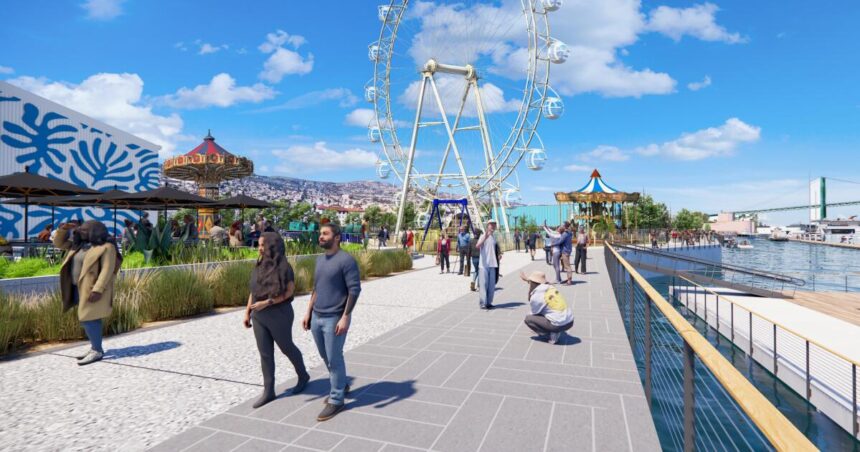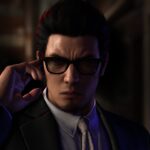The Port of Los Angeles will get an amusement park with a large observation wheel as part of West Harbor, the attraction being built to replace Ports O’ Call in San Pedro.
With the project’s $155-million first phase, which will include restaurants, bars and shops, set to open late next year, its developers announced plans to expedite construction of the next phase, which calls for more food tenants as well as an array of outdoor pickleball and padel courts.
Developers have also struck a tentative deal with the owners of popular San Pedro Fish Market to forgo plans to build an expansive $140-million and instead remain at West Harbor. The Fish Market is one of the top-grossing restaurants in the country but had to move from its longtime home on a wooden pier to make way for construction of West Harbor.
The West Harbor Wheel, as the Ferris wheel will be known, will be as high as 150 feet — about 50% higher than the Pacific Wheel at amusement center on Santa Monica Pier, he said. Riders will occupy enclosed gondolas that will provide views of the working port, the battleship, the Vincent Thomas Bridge and passing cruise ships.
Other attractions in the amusement park will include a carousel, a wave swinger and other carnival rides operated by SkyView Partners of St. Louis.
The public courts will be operated by the , which will manage six padel courts and 10 pickleball courts, which will be available to the public as well as for club and league games. The San Diego company puts on tournaments, glow-in-the-dark events and social mixers.
Other phase two tenants will include San Pedro pizzeria and Oakberry Acai and a park set aside for new pop-up restaurant and beverage concepts to test the waters.
The second phase will cost about $45 million, bringing the total cost for the first two phases to $200 million, said Eric Johnson, president of Jerico Development, which is co-developing West Harbor with the Ratkovich Co. Tenants will spend another $75 million building out their spaces, he estimated.
Among the tenants will be Yamashiro, a Japanese-themed restaurant that has been a Hollywood destination for decades and plans to on the waterfront.
Other announced tenants are Bark Social, an off-leash membership dog park and social club, experiential art gallery Hopscotch, Mike Hess Brewing, restaurants Poppy + Rose, King and Queen Cantina, and Mario’s Neighborhood Butcher Shop & Delicatessen.
Harbor Breeze Cruises will remain and the Los Angeles Maritime Institute’s wooden tall ships will dock at West Harbor.
Future phases are expected to include a hotel and a 6,200-seat amphitheater now undergoing an environmental review. The venue is being developed with music and theater impresario Nederlander Organization.
San Pedro Fish Market will also expand in phases, Chief Executive Mike Ungaro said. The first phase will be big enough to serve 1,600 people at a time with live and fresh fish for sale. It will operate for about three years.
After that, the Fish Market will open in another location at West Harbor that can seat 3,000 and would be one of the largest restaurants in the country, Ungaro said.
Currently the market is operating with mobile kitchens in temporary outdoor quarters in the parking lot next to their former site, where they served 450,000 diners and grossed $16 million last year, Ungaro said.
“It’s a testament to their brand, and their product, and the fierce loyalty of their clientele,” Johnson said.
Ports O’ Call, a kitschy imitation of a New England fishing village, opened in 1962. It was a major regional attraction where thousands came every year to stroll among quaint shops, take boat rides and dine by the water. For a period in the 1970s, the mast-like lifted visitors 30 stories high to show them giant tankers, cruise ships and fishing trawlers navigating the port.
But in the late 1980s, Ports O’ Call Village faded and grew shabby, a victim of changing tastes in entertainment and dwindling investment in its upkeep and improvement. Despite a last-minute, nostalgia-fueled community outcry and lawsuits from merchants and restaurants, all but the fish market was demolished in 2018 to make way for dramatic redevelopment, first proposed by the Harbor Commission five years before.
San Pedro company Jerico Development and Los Angeles developer Ratkovich Co. were selected by port officials to perform the makeover of the 42-acre site.










